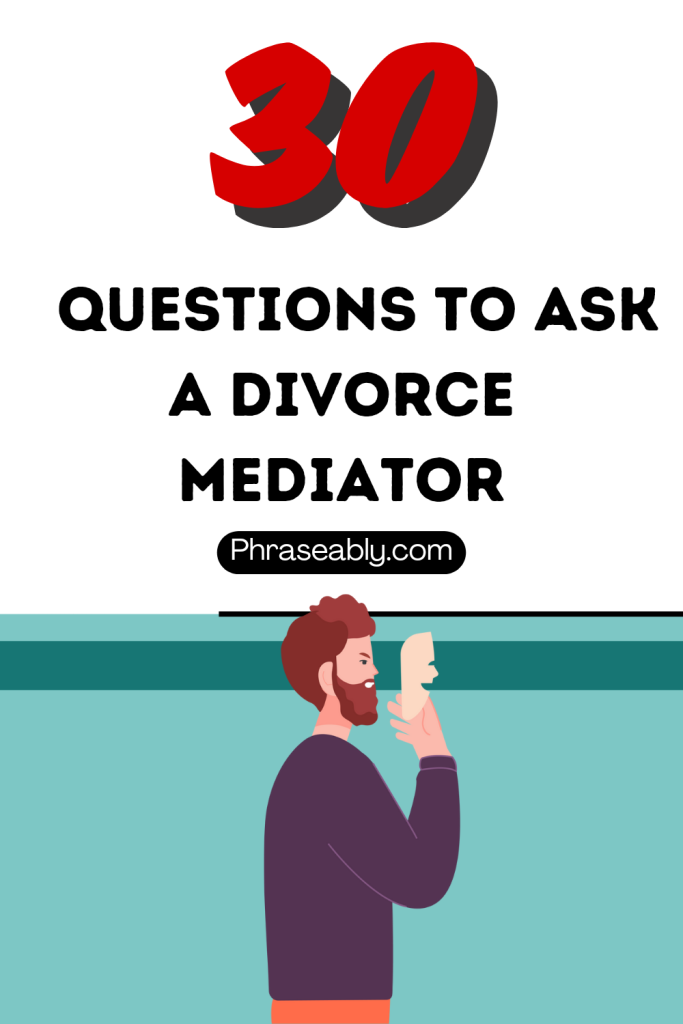Do you require the service of a divorce mediator? Do you need guidance to choose the best mediator?
A divorce mediator is a person, well-trained to be a third party between couples walking through a divorce, to aid negotiations, settle disputes, and ensure both parties reach a favorable conclusion.
Divorce mediation is becoming a very popular practice. People often seek this third party to facilitate their divorce proceedings for a better result.
So, if you need the service of a divorce negotiator, but you don’t know where to start, you’re in luck with this article. In this blog post, I’ll be discussing 30 questions you can ask them before making your choice.
30 Questions to Ask a Divorce Mediator
There are tons of questions you can ask a divorce mediator. However, in this article, I’ll be discussing 30 important ones you shouldn’t fail to ask.
They include questions about how they intend to help you and your partner, their license, their background, their charges, how to handle dishonest spouses, and many more.
Without further ado, let’s delve into 30 questions to ask a divorce mediator. Below is a list:
- Why do you propose mediation for us?
- What are your qualifications?
- Do you have a license?
- Are you conversant with the local divorce laws?
- Do you have a background in law?
- How do you plan to help us?
- How long does mediation take?
- How many hours do I have to sit per session?
- How do you charge?
- Do you cover the filing of court papers?
- How many cases have you handled?
- How many successes have you recorded?
- Do you also handle divorce litigation, if not, whom do you recommend?
- What happens with a disrespectful spouse?
- What happens when my partner is being insincere?
- What happens when our stories don’t match?
- Can mediation work if we no longer speak?
- What happens when my partner is uncooperative?
- What happens when my partner doesn’t show up?
- Is what we discuss here binding?
- Would I need a divorce lawyer after mediation?
- Can my attorney come with me?
- Can we talk separately?
- Can our children attend?
- Can we have online sessions?
- What happens if we don’t agree
- Can you assure me of your confidentiality?
- Do you offer follow-up services?
- How do you handle conflicts after mediation?
- Is there anything else I need to know?
Why Do You Propose Mediation for Us?
“Why Do You Propose Mediation for Us?” is one of the questions to ask a divorce mediator.
Maybe friends and families have requested you and your spouse use the service of a divorce mediator, but you’re not sure why. You can ask the mediator yourself when you meet them.
With this question, they’ll be able to lecture you on the necessity of using a third party when processing your divorce. Amongst other benefits, it helps both parties settle amicably.
What Are Your Qualifications?
Another question to ask a divorce mediator is about their qualifications.
While divorce mediators don’t have to be lawyers, they, however, need to undergo some training before qualifying to practice.
Besides earning a degree or two, there is basic mediation training on divorce they need to undergo before they can practice.
So, you should ask them about this qualification to be sure you’re working with someone who knows their onions.
Do You Have a License?
Another question to ask a divorce mediator is if they’re licensed to practice in that area.
Some states provide licenses for mediators to practice, so you should ask them about it.
Also, if you’re in an area where they need the certification, then you should make sure they have such approval before you employ their service.
Are You Conversant with the Local Divorce Laws?
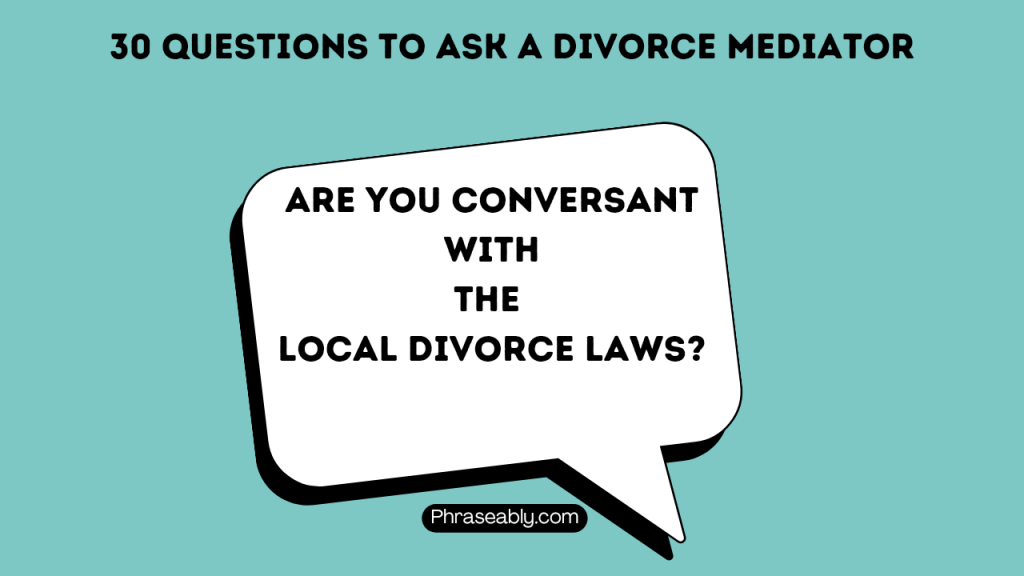
“Are you familiar with the local and state divorce laws?” is another question to ask a divorce mediator before proceeding with them.
States have their laws guiding divorce proceedings, and divorce mediator must familiarize themselves with these laws before serving their client.
So, don’t fail to make this inquiry to ensure you’re working with someone who knows the job well.
Do You Have a Background in Law?
“Do you have a background in law?” is another question you can ask a divorce mediator.
As I’ve already established, divorce negotiators don’t necessarily need to have a law degree to work as mediators.
However, some go ahead to get a master’s degree in law after a first degree in another discipline, while on their journey to becoming a mediator. But, you’ll find many mediators with no law degree.
Nevertheless, if you want a mediator with a background knowledge of Law, then you should ask them this question during your meeting.
How Do You Plan to Help Us?
Another crucial discussion to have with a divorce mediator is about their plan to help you.
Although a divorce mediator does the same job of facilitating communication and negotiation with couples who are seeking a divorce, an expert uniquely works with their client.
So, when meeting a divorce mediator and giving them the necessary first information, you should ask them how they plan to help you. Their answer will tell you if they know their job well.
How Long Does Mediation Take?
“How long does mediation take?” is another important piece of information you might want to find out from a divorce mediator.
Depending on the nature of the couple’s situation and how cooperative they are, mediation can last anything from three to six months.
Also, there’d be a need to get documents and deal with other important aspects, which adds to the time frame.
Being your first time going through a process of this nature, it’s natural to be skeptical about whether the arrangement is worth your time.
So, it isn’t out of place to want to know how long the whole exercise will last.
Moreover, you might want to know how you can adjust your schedule to accommodate it.
How Many Hours Do I Have to Sit Per Session?
Another information you might want to get from a divorce mediator before employing their service is how long a session lasts.
Typically a session lasts from 1-4 hours, depending on how cooperative the couples are.
So, if you want to know how many hours you’ll be assigned for this exercise, you shouldn’t fail to ask the mediator during a meeting. It’s important to make proper arrangements.
How Do You Charge?
“How do you charge?” is another important question to ask a divorce mediator.
Mediation fees can vary across states and mediators. A mediator can choose to charge per hour while some might choose per session.
Moreover, attorney mediators typically charge more than non-attorney mediators. So, don’t forget to ask this question when talking with a mediator to know which suits you.
Do You Cover the Filing of Court Papers?
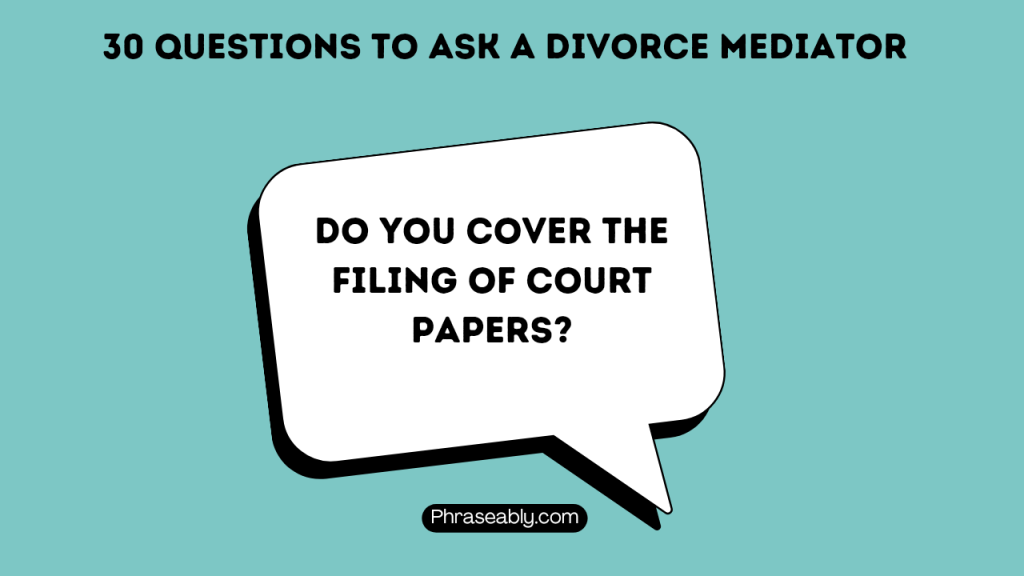
Another thing you should find from a mediator is if they take care of filing court papers.
You’d want to know if they’ll handle all necessary legal paperwork. Handling it can cut costs.
How Many Cases Have You Handled?
Another thing you might want to find out about a mediator is the number of cases they have handled.
This is a necessary question to find out if you’re dealing with an experienced mediator.
So, if you want to work with someone who has some sort of experience, this is the question to ask them.
How Many Successes Have You Recorded?
Another thing you can ask a divorce mediator is the number of successes they have recorded over time.
It’s a necessary question to ask after you have found out from them the number of cases they have handled.
While not all cases might end up successful, at least they should have recorded some successes that can move you to work with them.
So, don’t forget to ask them this question when comparing.
Do You Also Handle Divorce Litigation, if Not, Whom Do You Recommend?
Another important question to ask a divorce mediator is if they handle divorce litigation.
First, divorce litigation becomes necessary when cases cannot be resolved at home. In this case, the court intervenes to settle disputes.
So, you can ask a divorce mediator this question in case you and your spouse might need the help of the court. Also, divorce litigation is most time necessary when it involves cases of domestic abuse or violence, or serious financial issues.
What Happens with a Disrespectful Spouse?
Another question you should ask a divorce mediator is how they handle disrespectful spouses.
It can be quite challenging when you and your spouse meet with the mediator, and they end up making things difficult for everyone.
So, you should know if a mediator can handle a disrespectful spouse before hiring one.
What Happens When My Partner Is Being Insincere?
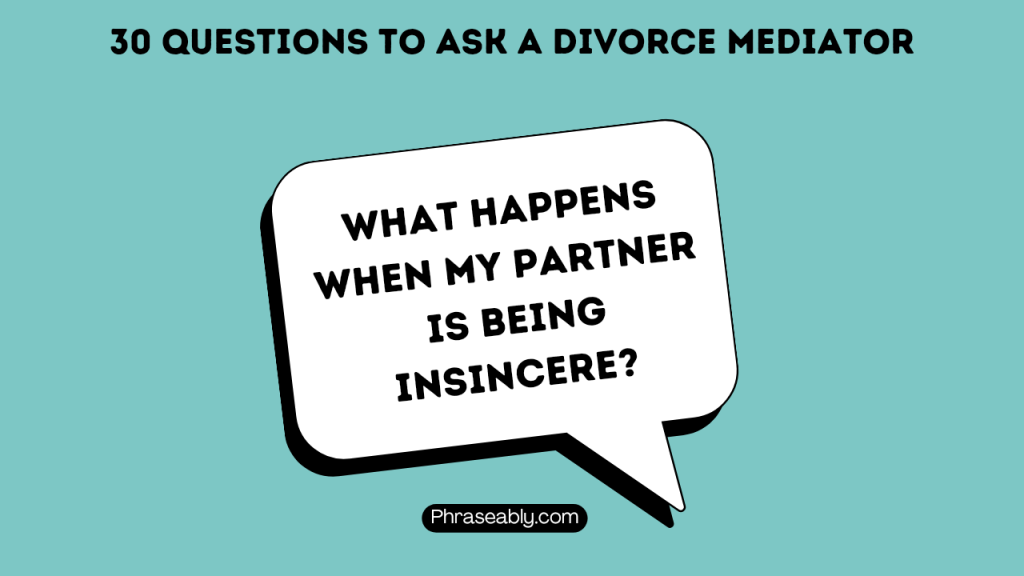
Another thing you should discuss with a divorce mediator is how they intend to handle an insincere spouse.
Now, this situation can be very tricky because it’ll be difficult for the negotiator to find out who’s telling the truth at that moment, except they have done an earlier finding.
However, you should discuss how they intend to handle things if it turns out your spouse is the dishonest one.
What Happens When Our Stories Don’t Match
Another tricky situation is when both partner’s stories don’t match. A good divorce negotiator should know how to handle such a situation.
So, make sure you ask them what they’ll do in such a situation to determine the best mediator for you.
Can Mediation Work if We No Longer Speak?
One of the things someone going through divorce usually asks when they and their partner are not on speaking terms is if mediation can work for them.
Of course, mediation can work when both parties are ready to cooperate. Couples don’t need to be friends to decide what will be best for both of them. As long they’re ready to talk to the mediator facilitating the process, mediation will certainly work.
However, it becomes a different ball game altogether when one partner is unwilling to speak.
So, talk to a mediator about this concern to learn more from them.
What Happens When My Partner Is Uncooperative?
Another important question to ask a divorce mediator is concerning an uncooperative partner.
Divorce mediation can’t work when one partner is unwilling to cooperate because it involves both spouses. So, you should ask a mediator this question before going ahead to hire them, so you don’t waste your time and resources in the end.
Also, the best way out of this situation is to talk to your spouse about it and make sure you both are on the same page before hiring anyone.
What Happens When My Partner Doesn’t Show Up?
Another important thing to ask a divorce mediator is about your spouse not showing up.
Although you and your partner might have agreed on mediation, it doesn’t guarantee that they’ll show up for all of the sessions.
While some spouse might genuinely be held up somewhere, some can intentionally be absent to frustrate their partner.
So, talk to a mediator about your concern to be sure you’re making the right choice.
Is What We Discuss Here Binding?
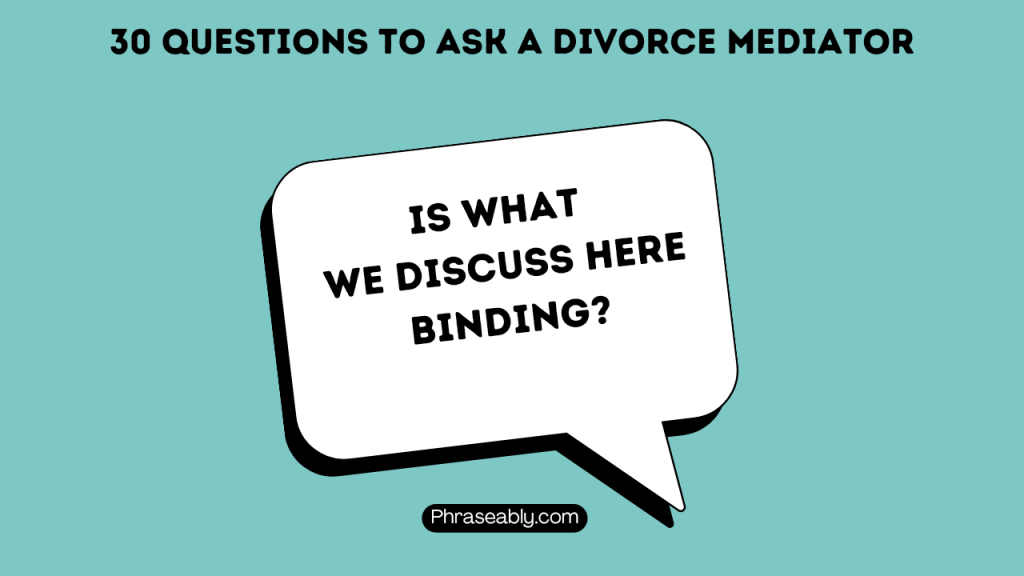
Another thing you might want to find out from a mediator is if all that is discussed during the sessions is binding on you and your spouse.
Mediation is binding if documents are signed. That is to say, if you and your spouse sign all mediated divorce agreements, whatever was discussed and is on the paper is legally binding.
Would I Need a Divorce Lawyer After Mediation?
Needing a lawyer even after going through mediation is entirely up to you. While mediation provides an out-of-court negotiation, a divorce lawyer can provide support and advice during child custody and property acquisition.
Can My Attorney Come with Me?
You shouldn’t forget to ask the mediator if you can come with your attorney. However, most mediators won’t appreciate the presence of lawyers at the discussion to prevent a situation where they take over speaking for their client.
So, rather than show you up with your attorney, ask a mediator about it first.
Can We Talk Separately?
Discussing separately is something you might want to find out from a divorce mediator. Since mediation is to help couples reach a cordial agreement, mediators won’t take on speaking privately with any of them.
However, it’s an option when things get heated and both parties get stuck.
Can Our Children Attend?
Children too can be involved in mediation, depending on their age and ability to understand the process. However, it’s not compulsory.
But, if you want your children to attend, you should talk to the mediator about it and they in turn will tell you how it’ll go.
Can We Have Online Sessions?
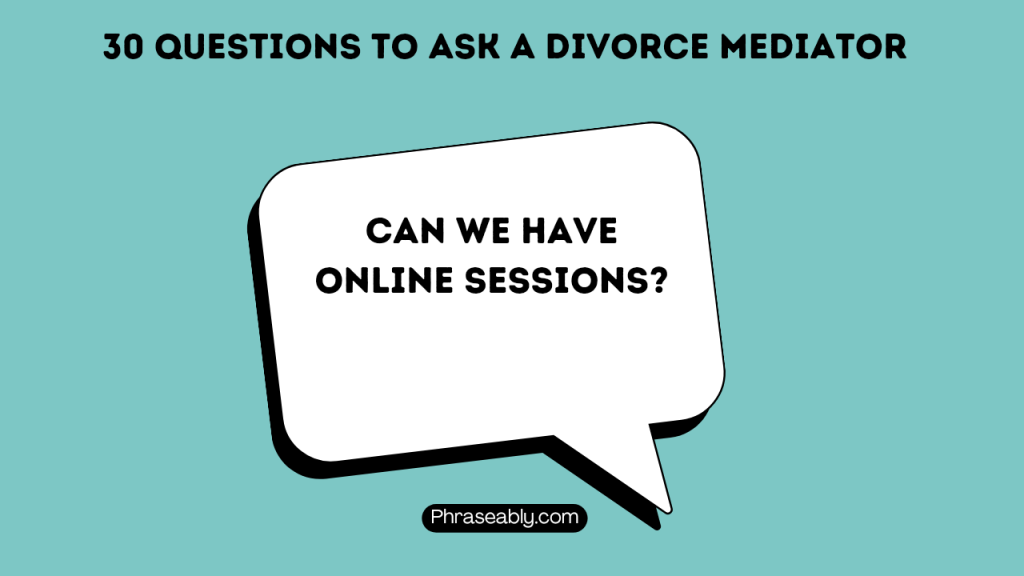
Another thing you might want to know is if you can have online sessions, especially if you and/or your spouse live far away.
Yes, online sessions are possible. However, you shouldn’t fail to have this discussion with the mediator first.
What Happens if We Don’t Agree
“What happens if we don’t agree” is another thing you should find out from a mediator.
Your divorce negotiator should be able to tell you what would happen if, in the end, you and your partner can’t agree.
In most cases, lawyers are involved. However, if it doesn’t work out, the court would have to be involved.
Can You Assure Me of Your Confidentiality?
Another thing you should ask a divorce mediator is if they can keep what is discussed with them confidential.
Confidentiality is very important to protect the interests of your family. So, make sure you ask them for their confidential policies.
Do You Offer Follow-Up Services?
Some mediators offer follow-up services, like ensuring that things move smoothly until the whole process is over.
Knowing that they’re still with you till the end is comforting.
How Do You Handle Conflicts After Mediation?
Conflicts can arise even after a smooth mediation. So, ask the mediator how they intend to take care of such a situation.
Is There Anything Else I Need to Know?
A final question to ask a divorce mediator is whether there’s anything else you’re missing. After exhausting your list of questions, don’t fail to ask them this questions to make sure all necessary things are discussed before proceeding with them.
Final Words
Going through a divorce can be emotionally demanding and exhausting, especially with a difficult spouse.
However, with the help of a mediator, you can come to an agreement that’ll suit everyone, including the children, even with that difficult spouse.
But, before you hire a mediator, ensure they’re the right one for you. By asking them certain questions, you can choose the best mediator for you.
This article has provided you with important questions to ask a mediator.
